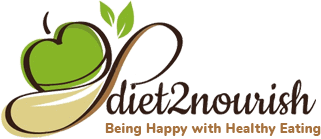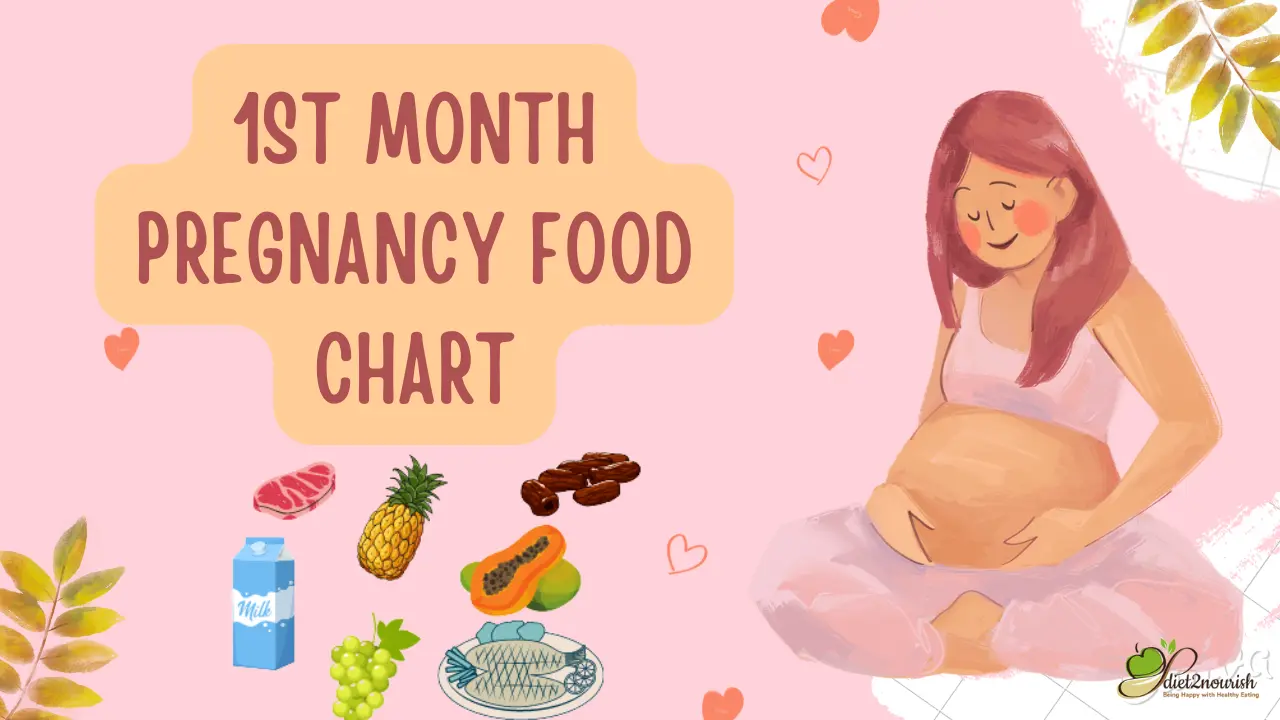First Month Pregnancy Food Chart
Pregnancy is one of the most beautiful moments in a woman’s life, and the joy begins with the early symptoms of pregnancy. The first trimester is the essential period for the growth of your unborn child. Most importantly, the first month of pregnancy is when a proper First Month Pregnancy Food Chart has to be followed. Your baby’s bodily structure and organ systems grow throughout this time. During this time, the majority of miscarriages and birth abnormalities happen. These symptoms bring extreme pleasure along with anxiety and nervousness. This is a time in your life when you, as a woman, will bring happiness to the whole family. But it is also your responsibility to ensure that you follow a balanced diet chart for pregnant women. In this blog, we will talk about the First Month Pregnancy Food Chart.
How Diet Plays an Important Role?
Pregnancy is the most memorable time for every woman. During this time, you need to take a lot of care of yourself because what you eat directly affects the baby. It can also be understood that the child gets their nutrition from whatever they eat. Therefore, you are advised to eat food rich in nutrition and health. This keeps both mother and child health. But, as we have already been told that this is the most memorable time of their life for every woman, this time is also full of complications. Actually, many women do not understand what they should eat during pregnancy and what not. Due to a lack of information, people often eat such things, which can cause harm. Because in the early days of pregnancy, many people do not know about it, and those who do know are confused. In this blog, we will discuss the first month pregnancy food chart.
Common Pregnancy Symptoms in First Month Pregnant
You might not experience many, if any, symptoms at one month pregnant. However, certain early pregnancy indicators can include:
- Missing Period
- Mood Swings
- Bloating
- Cramps
- Spotting,
- Frequent urination
- Fatigue
- Sore or tender breasts
- Food Aversions
- Nausea
What is to be done during these symptoms?
During all this, the first month pregnancy food chart plays a vital role in the primary health of your child’s health. The goal of nutrition is to provide your body with the nutrients it needs by eating a healthy, balanced diet. Our bodies require nutrients from food to function and flourish. They consist of water, vitamins, minerals, proteins, lipids, and carbohydrates.
12 Foods to include in your 1st Month of Pregnancy Diet Chart
Only about two and a half weeks into pregnancy do you start to feel the effects of being pregnant. As a result, you must adhere to a particular diet strategy which is a first month of pregnancy diet chart.
Food List to be followed during the First Month of Pregnancy
1. Dairy Products
Dairy products are an excellent source of calcium, vitamin D, protein, healthy fats, and folic acid, especially fortified varieties. Yogurt and milk are excellent sources of these nutrients, so include them in the first month pregnancy food chart.
2. Foods High in Folate
Folic acid aids in the formation of the neural tube in the early stages of fetal development. Folic acid is crucial because it can prevent serious birth malformations of the baby’s spine and brain (anencephaly) (spina bifida).
Even if you take folic acid supplements, it’s still vital to include foods high in folate in the first month pregnancy food chart. Citrus fruits, beans, peas, lentils, rice, and fortified cereal are a few examples of these foods.
3. Natural grains
Whole grains are a good source of fiber, vitamin B complex, and minerals like selenium, magnesium, and iron. These are crucial for the growth and development of your child. Barley, brown rice, buckwheat, bulgur wheat, millet, and oatmeal are a few examples of whole grains.
4. Poultry and Eggs
Proteins, vitamins A, B2, B5, B6, B12, D, E, and K, and minerals like phosphorus, selenium, calcium, and zinc, can all be found in eggs. Additionally, a great source of protein is poultry.
5. Fruits
Several vitamins and antioxidants are found in fruits such as musk melon, avocado, pomegranate, banana, guava, oranges, sweet lime, strawberries, and apples, which are essential for the development of the unborn child in the womb.
6. Meats
Proteins, zinc, iron, vitamin B, and other nutrients found in meat are healthy for you and the unborn child. In the first month of pregnancy, include lean meats in the first month pregnancy food chart.
7. Cod Liver Oil
Omega-3 fatty acids, critical for fetal brain growth and eyes, are abundant in cod liver oil. All the more incentive to consume vitamin D since it can prevent preeclampsia.
8. Dried Fruits
For pregnant women, one serving of dried fruits has a wealth of vitamins, minerals, iron, potassium, and folate. Dates and prunes are both good options. To prevent consuming more than one helping at once, keep in mind that these are also high in natural sugars.
9. Iodized Salt
Use only iodized table salt while pregnant. Iodized salt can aid in the correct development of the baby’s nervous system and brain.
10. Veggies
Your baby will receive all the nutrition it needs if you put enough vegetables on your plate. Broccoli, kale, spinach, carrots, pumpkin, sweet potatoes, tomatoes, bell peppers, maize, drumstick, eggplant, cabbage, etc., are some vegetables you should incorporate.
11. Nuts and seeds
Healthy fats, vitamins, proteins, minerals, flavonoids, and dietary fiber are in large quantities in seeds and nuts. Throughout the first month of your pregnancy, make sure you eat these frequently.
12. Fish
Protein from fish is both high-quality and low-fat. Omega-3 fatty acids, vitamins B2, D, and E, and essential minerals like potassium, calcium, zinc, iodine, magnesium, and phosphorus are also abundant in them.
Avoid these 9 Foods in your First Month of Pregnancy Diet Chart
Certain foods should be avoided throughout and eliminated from your first month pregnancy food chart. Here are a few examples:
Food List to be avoid during the First Month of Pregnancy
1. Cheese
Soft cheese includes bacteria that can lead to food illness because it is manufactured from unpasteurized milk. As a result, it’s better to stay away from soft cheese in the first trimester.
2. Processed and packaged food
Preservatives and empty calories are found in packaged and processed foods, including drinks, microwaveable meals, cakes, biscuits, condensed milk, etc. Additionally, some packaged goods could have microorganisms that lead to food illness. Rather, eat freshly prepared meals made with natural or organic ingredients.
3. Limit Seafood
High mercury levels in seafood can cause fetal brain damage and delay developmental milestones. Limit your intake of tuna, salmon, mackerel, sardines, trout, herring, swordfish, and raw shellfish.
4. Papaya
Latex in unripe and semi-ripe papayas induces uterine contractions that lead to preterm labor or miscarriage. Stay away from them when pregnant. However, if your doctor gives the all-clear, ripe papayas are nutrient-rich and safe to eat in moderation.
5. Pineapples
Bromelain, a substance found in pineapples, can soften the cervix and cause miscarriages or preterm labor. Therefore, it is best to avoid pineapples throughout the first trimester.
6. Meat and eggs that are uncooked or raw
Raw or undercooked meat may contain bacteria, such as salmonella and listeria, which can harm an unborn child’s development. Roundworm cysts are present in even slightly undercooked pork, and they can seriously harm a baby’s health.
7. Coffee
Early in pregnancy, caffeine intake should be kept to a minimum because too much can produce restlessness, irritability, and nervousness. Additionally, it raises the chance of miscarriage.
8. Liquor that is alcoholic
Alcohol harms the growing fetus since it can result in serious birth abnormalities.
9. Sweet Treats
A pregnant mother needs an additional 300 calories daily for the baby’s growth. But a diet high in sweets can result in weight gain and gestational diabetes.
Most Important TIPS to follow during your First Month Pregnancy Food Chart
- Take folic acid-containing prenatal supplements.
- Before beginning a stringent diet regimen, consult your doctor.
- The key is moderation; even healthful meals should be consumed sparingly. Anything in excess is harmful.
- Reduce your junk food intake and fill your plate with fruits and veggies.
- Ingest water.
- In between all these, drink plenty of water. But avoid drinking too much water at once. Drink at least 6 to 8 glasses of water throughout the day. Besides maintaining the body’s necessary moisture, Shah will also control the body temperature.
- At this time, to keep the body healthy, you must do walking, yoga, or other light exercises. You can also do meditation to keep the mind calm and focused. This will help in reducing unnecessary stress.
What is the importance of consulting a Dietitian during the first month of pregnancy?
You can get the essential nutrients into your body before and during pregnancy with the aid of prenatal nutrition. Studies have shown that good nutrition and weight control before and during pregnancy impact a baby’s growth. But consulting is dietician is crucial during this time; which helps you with gaining weight healthily and provides you with a personalized first month pregnancy food chart, and is always available for your help.
Our dietitians at diet2nourish develop sustainable dietary habits to keep you healthy, energized, and satisfied during pregnancy. Remember that during pregnancy, you will have ups and downs and that your energy levels will frequently be at an all-time low. Laying the proper foundation is crucial if you want to maintain your energy throughout your everyday activities.
Our nutritionist and dietitian services at diet2nourish include diet and nutritional counseling with a skilled dietician with specialized training in pregnancy.
The Bottomline
During the first month of pregnancy, your body goes through several changes. Morning sickness, exhaustion, and mood swings can all be brought on by hormonal changes. To reduce these symptoms and maintain the health and happiness of your baby, practice nutritious eating, follow a first month pregnancy food chart, proper hydration, light exercise, stress-free living, and stay connected with your dietician.
Frequently asked questions (FAQs)
How does age and height affect recommended weight gain in pregnancy?
Answer:
Age and height can affect recommended weight gain as they can impact your body mass index (BMI). Generally, the recommended weight gain during pregnancy is based on your pre-pregnancy BMI. It is calculated based on your height and weight. Women with a lower pre-pregnancy BMI may need to gain more weight during pregnancy.
On the other hand, women with a higher pre-pregnancy BMI may need to gain less weight. Additionally, older women may have different weight gain recommendations than younger women. This is because age can impact factors such as metabolism and nutrient absorption.
How can I maintain a healthy weight after pregnancy?
Opting for a gradual and sustainable approach to weight loss after pregnancy is recommended.
Incorporating healthy eating habits, physical activity, and seeking professional guidance can aid in achieving postpartum weight goals.









